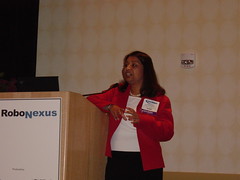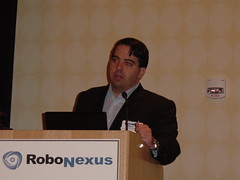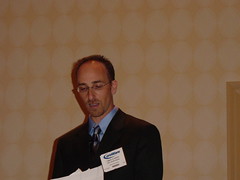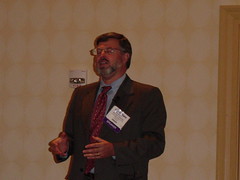RoboNexus Day 1 - Business Development and Opportunities
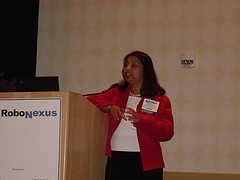
Another main theme of the talks on day 1 was the business development and opportunities in robotics.
The first speaker in this series was Neena
Buck from Strategy Analytics who talked about commercial opportunities and constraints
for mobile robotics. Buck started off by showing how the US has been gearing all robotics research toward
defense and aerospace robots while the Far East
has been focused on developing more social purpose biped and humanoid robots.
She then used this difference to explain the status of the current robotics
businesses: consisting of “soup-to-nuts” robot manufacturers,
component suppliers, hobbyist kits and a lot of hopefuls who are either
hobbyists or educators.
Coming from a non-robotics background, she complained
how robotic companies never: understand the consumer’s needs, understand
the price the consumer is willing to pay, understand the quality of product the
customer expects and understand the
benefits of branding and other marketing strategies. She then used this to
illustrate how iRobot broke the trend with the roomba and how that created a huge success.
Her
“next big app” ideas were to partner up with a manufacturer of
whatever existing non-automated device that you are automating or to position
yourself as a part of the supply chain connecting component vendors and
developers.
Louis Ross from Global Emerging Technology Institute (GETI) talked next about the services offered by GETI. GETI focuses on researching research groups around the globe in the field of MEMS and nanotechnology and then creating collaborations between their technologies to bring out new MEMS products for OEM's and for commercial applications using MEMS. I talked to Ross and Miwako Waga, their Managing director in the Japan office, after the talk and they were both interested in being contacted to find out about getting access to MEMS and nanotechnology developments in the Far East.
The biggest attraction in this series for the day was the talk by Lance Ulanoff from PCMag.com. Since the RoboBusiness conference in Cambridge, MA, I've heard him request to retire the term 'robot' to save the robotics industry. Today I got to hear why. From the perspective of a consumer electronics/application robot, it made sense how the term robot implies a frightening change. And that is exactly what iRobot did when they first introduced the roomba. However, it is hard to ignore how the whole situation is analogous to how the term “PC” was thought of around about 30 years ago. Will history repeat itself and prove Ulanoff wrong? Will we lose the hobbyist robotics in the process?
The last speaker was Michael Chester from International Marketing\r\nConsultants who talked about how to set up a business, how to get funding, how\r\nto market it and finally, how to exit. Louis Ross from Global Emerging Technology Institute (GETI) talked next about the services offered by GETI. GETI focuses on researching research groups around the globe in the field of MEMS and nanotechnology and then creating collaborations between their technologies to bring out new MEMS products for OEM’s and for commercial applications using MEMS. I talked to Ross and Miwako Waga, their Managing director in the Japan office, after the talk and they were both interested in being contacted to find out about getting access to MEMS and nanotechnology developments in the Far East.
The biggest attraction in this series for the day was the talk by Lance Ulanoff from PCMag.com. Since the RoboBusiness conference in Cambridge, MA, I’ve heard him request to retire the term “robot” to save the robotics industry. Today I got to hear why. From the perspective of a consumer electronics/application robot, it made sense how the term robot implies a frightening change. And that is exactly what iRobot did when they first introduced the roomba. However, it is hard to ignore how the whole situation is analogous to how the term “PC” was through around about 30 years ago. Will history repeat itself and prove Ulanoff wrong? Will we lose the hobbyist robotics in the process?
The last speaker was Michael Chester from International Marketing
Consultants who talked about how to set up a business, how to get funding, how
to market it and finally, how to exit.
Thanks for helping to keep our community civil!
This post is an advertisement, or vandalism. It is not useful or relevant to the current topic.
You flagged this as spam. Undo flag.Flag Post


